Custom shirts, endless possibilities
Industry experts forecast that the worldwide customized t-shirt printing market will reach 3.1 billion by 2025, proving that selling t-shirts online is a great way to make money.
Selecting the best place to sell t-shirts online is essential to make a profit. A sales channel that’s a good fit for your eCommerce business will make reaching your target audience easier.
In this article, we explore some of the best platforms and marketplaces for an online t-shirt business, evaluating their pros and cons so that you can make an informed decision.
This post may contain affiliate links, which means we may earn a commission if you make a purchase through those links. This comes at no additional cost to you.
How to select the right sales channel?
When choosing a sales channel, carefully evaluate your business goals, technical expertise, and the type of audience you want to reach. What is effective for one business might deliver different results for another.
With these considerations in mind, you can evaluate the following key aspects to determine the best sales channel for your specific needs.
- Ease of use. Assess how intuitive and user-friendly the sales channel is. Is it easy to set up, navigate, and maintain? How steep is the learning curve? A sales channel with a user-friendly interface can streamline your business operations.
- Design flexibility. Examine the customization options for storefronts, branding, and content. While eCommerce platforms offer the freedom to design an original online store, marketplaces often have a predefined structure, limiting customization possibilities.
- Fees. Evaluate the cost structure, including subscription costs, fees, and transaction processing charges. Considering these costs is important to ensure your t-shirt business remains profitable and competitive.
- Tools and features. Explore each channel’s payment gateways, marketing and analytics tools. Check which ones are built-in and which ones require a subscription. Tools and features increase efficiency, analyze customer data, implement effective marketing strategies, and enhance the customer experience, which drive sales and foster long-term business success.
- Support. Consider the quality and accessibility of customer support, including availability, response times, and support channels.
If you carefully evaluate your goals and the advantages and limitations of each sales channel, choosing the right one will be much easier.
The best places to sell t-shirts online
Etsy
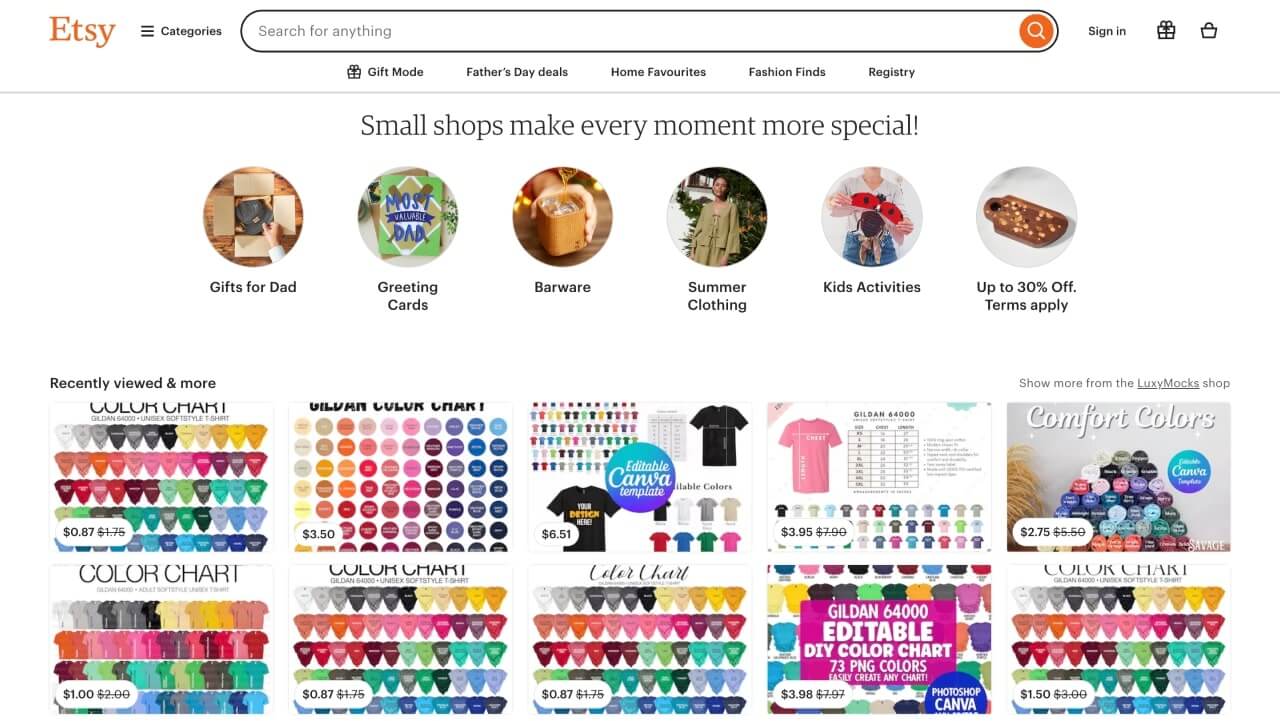
Etsy is one of the largest eCommerce marketplaces in the world. It boasts over 92 million active buyers worldwide, highlighting a significant customer base for unique products. It’s a great starting point for anyone looking to make money selling t-shirts.
Pros:
- Beginner-friendly marketplace. Etsy is famous for its easy registration and setup. If you don’t have experience in eCommerce, selling t-shirt designs on Etsy is a great option.
- Effortless promotion. Get your custom t-shirts seen in no time! Start promoting your custom t-shirts quickly with Etsy Ads campaigns.
- Built-in search analytics. Etsy’s analytics provide insights into how people find your shop through search. You can see which search queries are most relevant to your products and how many sales you get from these searches.
Cons:
- Tough competition. Everyone is competing for a share of the market. Stand out by learning what a niche is, selecting a profitable one, and modifying your t-shirt design accordingly.
- Various fees. Etsy has a listing, transaction, shipping, and other fees. Even though they’re not high, they add up, so check how much Etsy takes per sale.
- Limited customization. The marketplace has predefined templates for almost everything. While it’s great for beginners, as your t-shirt business grows, it can become hard to distinguish yourself from others.
In conclusion, Etsy is one of the best places to sell custom t-shirts online for entrepreneurs who are just starting out.
Quick tip
Learn how to start an Etsy shop from our quick guide.
eBay
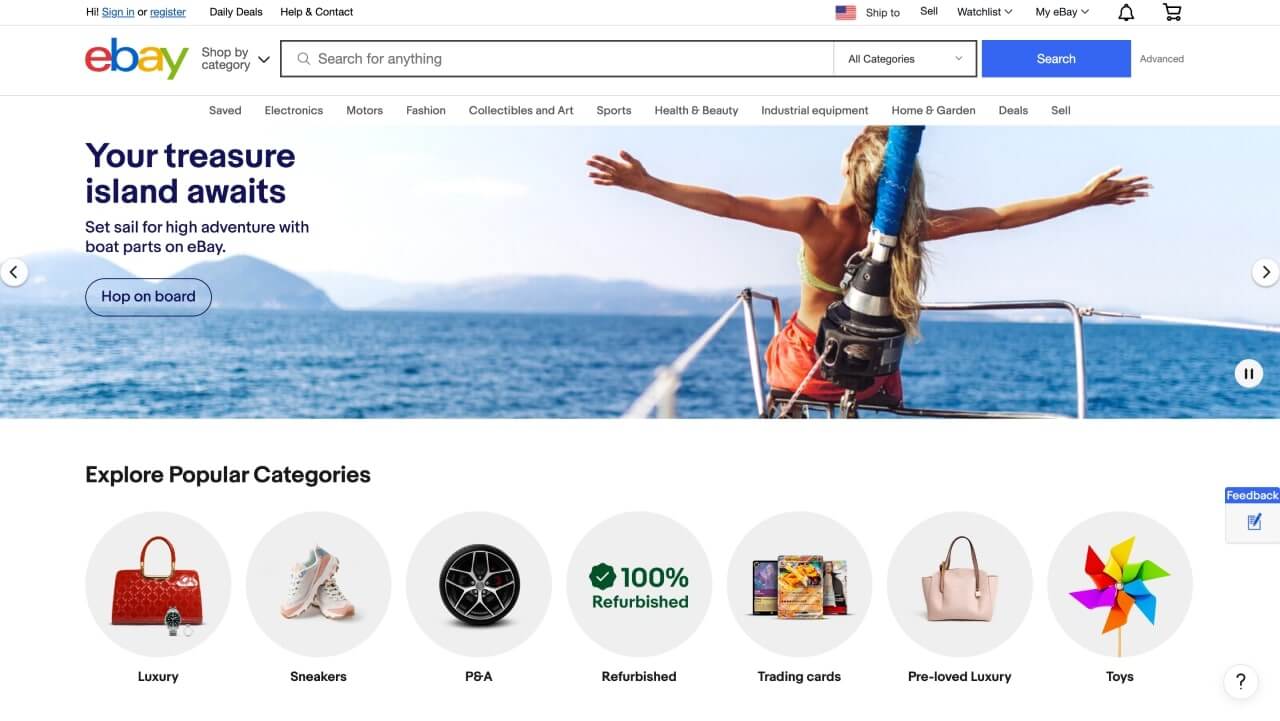
eBay, one of the oldest online marketplaces, continues to draw a massive audience with 1.2 billion monthly visits and boasts 132 million active buyers.
eBay has a great reputation and a wide reach. The marketplace allows people and businesses to buy and sell various products worldwide.
Pros:
- Easy to use. Starting an online t-shirt business on eBay is easy. You can set up your store without any technical knowledge. Just create an eBay account and register as a seller.
- A wealth of tools. For example, Terapeak, a research tool, provides valuable insights into popular products; the AI description feature, accessible when listing an item, automatically generates product descriptions; and the Bulk Listing Tool enables faster relisting and revision of items.
- Helpful resources. eBay provides useful resources for existing and new sellers, explaining the process of setting up an account in detail, listing items, and managing sales, as well as giving practical tips for successfully selling products on their marketplace.
Cons:
- Competitive landscape. Similarly to Etsy, eBay is competitive, especially for popular products like t-shirts. However, if you create unique designs, learn how to price a product, and implement effective marketing strategies, it’ll be easier to stand out.
- Various fees. eBay has multiple fees you should be aware of. eBay’s Selling fees page provides a breakdown of the different fees you may incur, including insertion, final value, and optional listing upgrade fees.
- Strict rules and policy. You’re not quite in charge of everything regarding the return policy and other operational details. You need to closely follow eBay’s regulations if you want to sell on their site.
If eBay seems like a good home for your t-shirt brand, watch our webinar on how to sell on eBay in 2024 to learn tips and tricks for increasing your sales. Or, if you prefer reading, here’s a list of essential tips for selling on eBay.
Shopify

Shopify is a great eCommerce platform for building an original store and selling t-shirts online. If you want to start your own brand and have control over your store’s design, functionality, and customer experience, it’s an excellent option.
Pros:
- Intuitive and easy to use. With a user-friendly interface and customizable templates, you can quickly build a professional store without extensive technical knowledge.
- Abundance of themes. The platform offers a wide selection of professional themes, allowing you to customize the look and feel of your store to match your preferences.
- Wealth of apps. The Shopify App Store has a lot of apps for optimizing a store – from marketing to sales to analytics tools. As your t-shirt business grows, you can add additional functionality and features to increase the likelihood of making even more money.
Cons:
- Subscription costs and transaction fees. While Shopify offers various pricing plans, including a basic one for solo entrepreneurs, costs can add up with transaction fees.
- Challenging marketing. The traffic you get depends on how well you market your products online. It has no pre-existing traffic like on eBay or Etsy
- App and add-on costs. While their app store offers many add-ons and plugins to enhance functionality, many come with additional costs. Over time, these expenses can accumulate, impacting your overall profit.
If you’re ready to start a Shopify t-shirt business, our step-by-step guide provides all the information aspiring entrepreneurs need to sell custom t-shirts successfully.
Quick tip
Try Shopify’s free trial to see if it’s a good fit for your business.
WooCommerce
![WooCommerce The best place to sell t-shirts online: A quick guide for [bp_year] 1](https://printify.com/wp-content/uploads/2025/02/WooCommerce-1024x576.png)
WooCommerce is a free, open-source plugin designed for WordPress websites that can transform them into fully functional stores.
Pros:
- Extensively customizable. Check the WooCommerce Theme Store for themes, or find free ones in the WordPress Theme directory.
- A wealth of plugins. Users have access to a wide array of plugins through the WordPress Plugin directory and WooCommerce Extension Store.
- Effective marketing solutions. WooCommerce offers various marketing solutions for social media, email marketing, promotions, and other tools that help increase sales.
Cons:
- Various expenses. Although WooCommerce is free to download and set up, building a functional store requires purchasing extensions, covering transaction fees, and managing hosting costs for your website.
- Requires technical know-how. WooCommerce is more complex than previous options. While it’s relatively easy to use, it does require some technical expertise.
- Limited plugin support. WooCommerce exclusively caters to its own products that are available on its platform. This means that each theme, plugin, and hosting service may have a different support channel.
If you already have a WordPress website, WooCommerce is an excellent option. However, it’s important to note that it involves a notably steeper learning curve, so it may require more time and effort to set up.
Wix
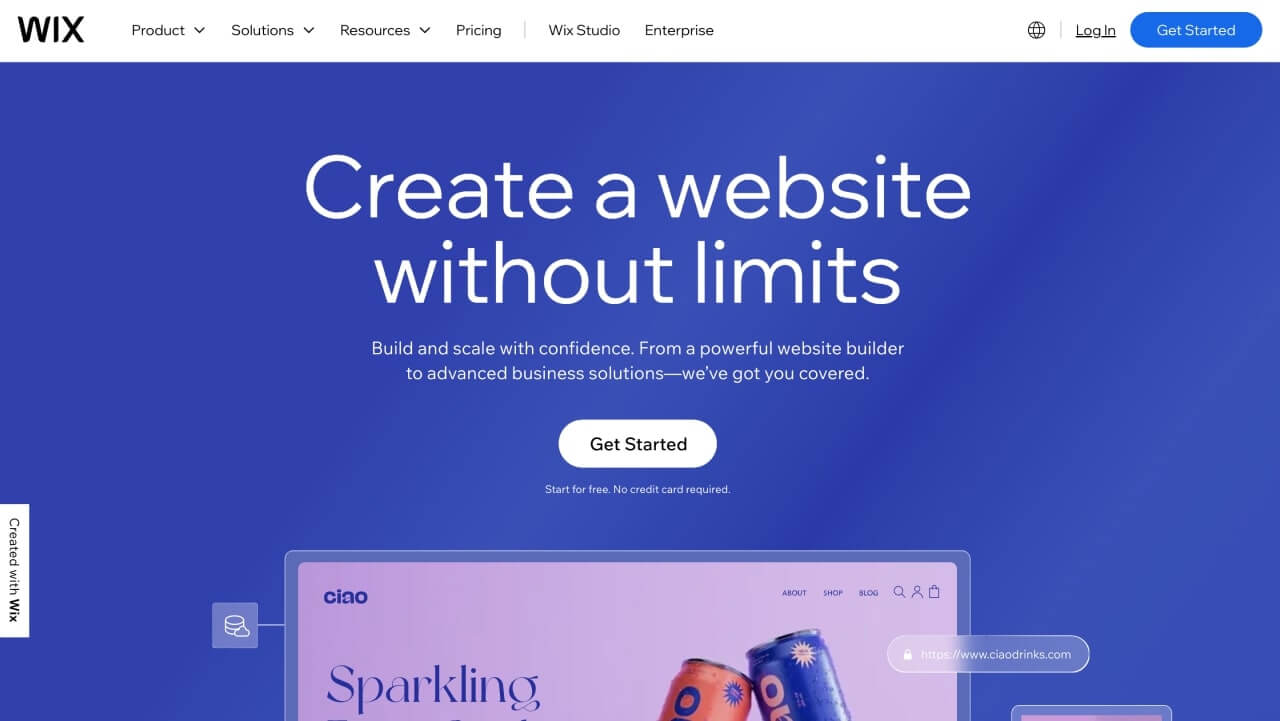
Wix is a cloud-based platform that allows people to create a beautiful store using drag-and-drop tools, templates, and various features without any coding skills.
Pros:
- User-friendly interface. The platform is intuitive and easy to use. Even beginners can quickly create a fully functional store with Wix.
- A suite of search engine optimization (SEO) tools. The platform has an excellent SEO infrastructure, providing automatic image optimization, personalized SEO setup checklists, Google Search Console integration, and other useful functionality to increase organic traffic.
- Free hosting service. Wix provides reliable hosting services and handles website maintenance, allowing you to focus on marketing and selling t-shirts without worrying about technical aspects.
Cons:
- Wix branding. Nothing’s completely free – the free Wix plans display Wix branding on websites, which can distract potential customers and make your store appear less professional. Removing Wix ads requires upgrading to a paid plan.
- Difficult to switch templates. After you choose your initial Wix template, you can’t switch to a different one. However, it’s possible to make a new Wix site with a new template. Learn more about switching your site template from Wix.
- Long-term cost. While Wix offers free plans, many advanced features and functionalities require paid subscriptions, and costs can add up over time, especially when factoring in additional apps or services.
Wix has both free and paid plans for businesses of all sizes. It’s a great solution for those who want to sell online without a complicated website-building process.
Squarespace
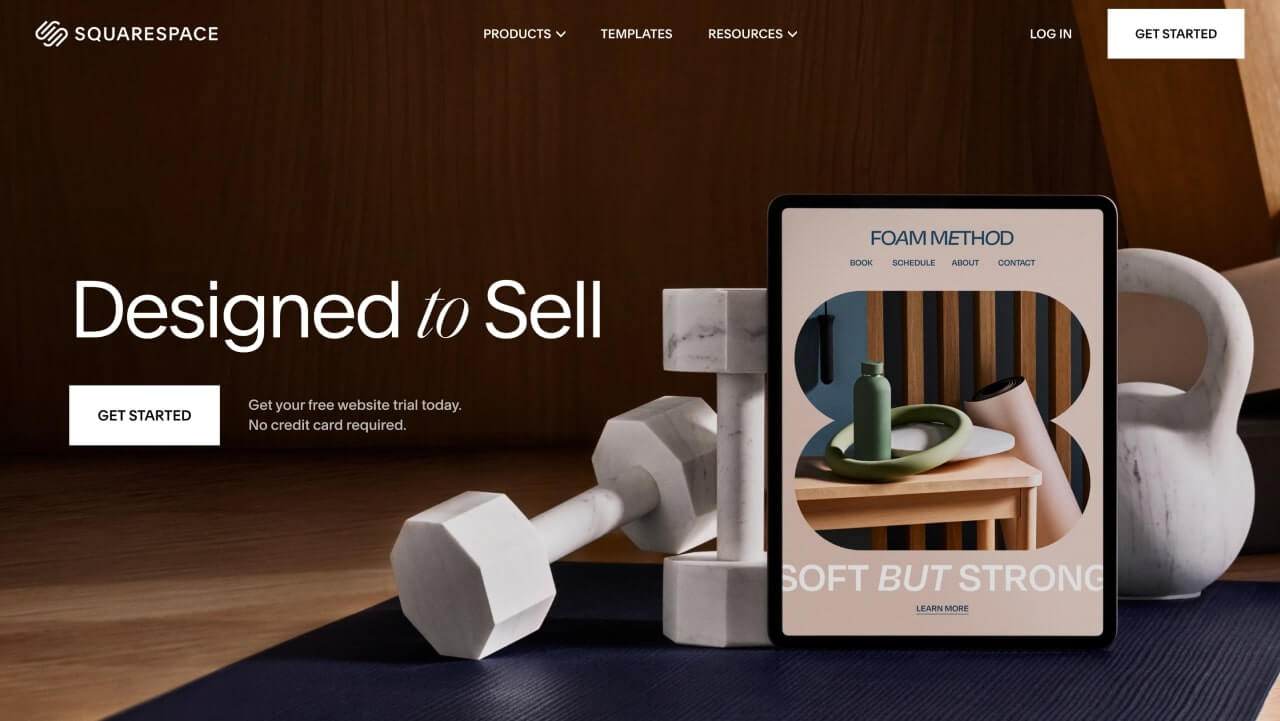
Squarespace is a powerful website builder for entrepreneurs of all skill levels. This all-in-one platform is a major player in the world of eCommerce and is perfect for selling t-shirts.
Pros:
- User-friendly. A great part of Squarespace’s allure is its intuitive and easy-to-use interface, which allows people to create beautiful stores easily.
- Wide variety of templates. Squarespace has a large collection of stunning templates, some of which you can adjust to better suit your vision.
- Great customer support. Squarespace has 24/7 online support, ready to answer any questions, solve problems, and help you build your site.
Cons:
- No multi-currency selling. If you want to offer custom t-shirts to a global audience, other platforms make it a little easier.
- Limited customization. Some users say that templates lack flexibility in design and layout, preventing them from creating sites as complex as they would like.
- Limited third-party integrations. Squarespace has only a curated selection of 41 extensions, which may not cover the full range of functionality that some users require. This limitation can be frustrating for those who rely heavily on specific third-party tools or services.
All that considered, Squarespace is definitely a convenient platform for a print-on-demand t-shirt business.
BigCommerce
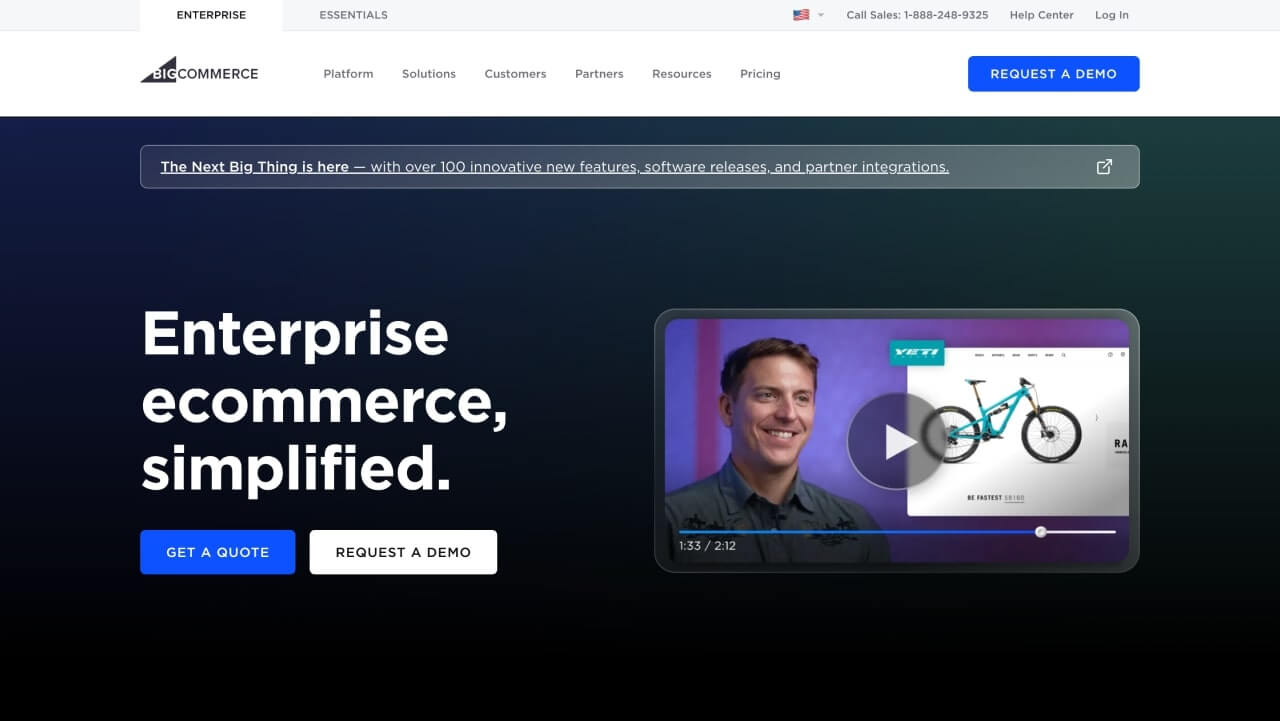
BigCommerce is a popular eCommerce platform trusted by small and large businesses worldwide. With BigCommerce, entrepreneurs can quickly create a store and start selling their custom t-shirt designs.
Pros:
- Various features. The platform has blog functionality, professional analytics tools, multi-currency selling, and much more.
- No additional transaction fees. BigCommerce doesn’t charge additional transaction fees. However, there are credit card processing fees, which vary depending on the payment processor.
- Cross-channel eCommerce. The platform provides various cross-channel eCommerce solutions, including Facebook, Pinterest, and Instagram integrations, allowing you to sell custom t-shirts effectively and make more money.
Cons:
- Annual sales threshold. Their plans come with yearly sales limits. You need to upgrade the plan if this limit is exceeded.
- Limited selection of free themes. The platform only has a dozen free themes.
- Expensive abandoned cart saver feature. This feature isn’t included in the Standard plan, so you’ll need a more expensive one.
In short, it’s great for beginners and professionals alike, providing everything they need to start, manage, and grow a business.
PrestaShop
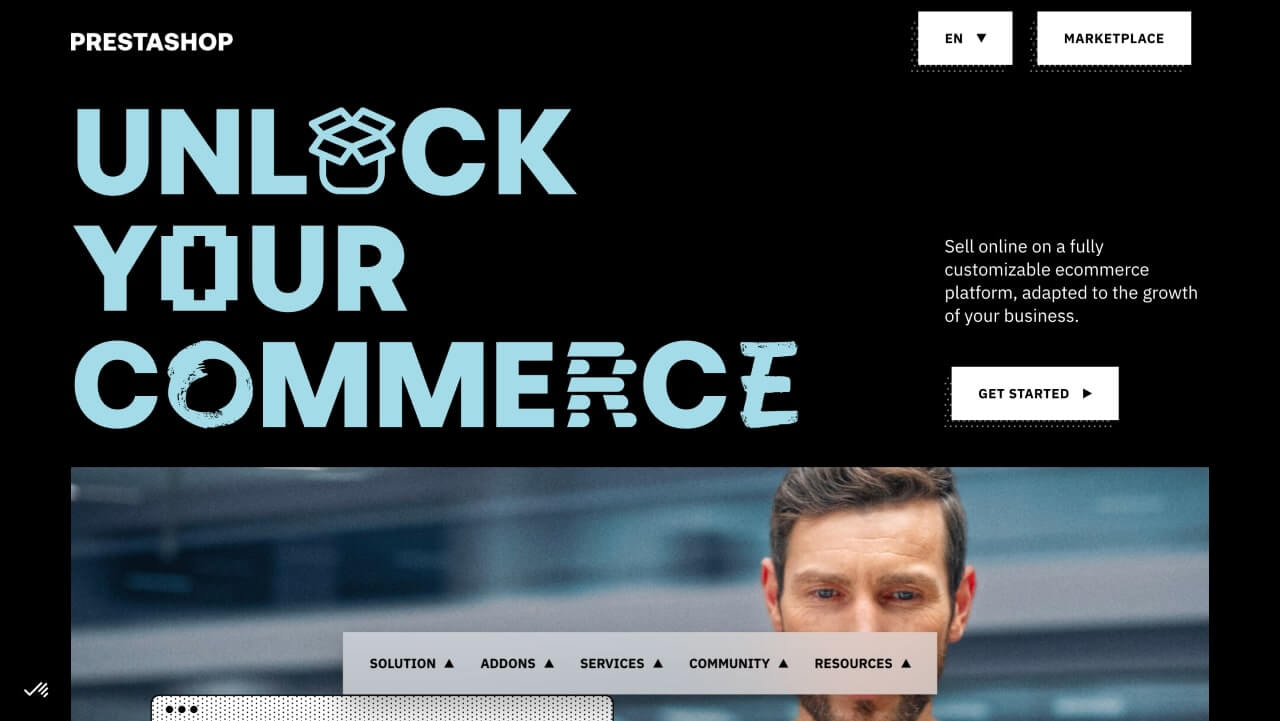
PrestaShop is an open-source eCommerce solution. With a wide selection of features and customization options, it’s one of the best places to sell t-shirts. However, the platform requires some technical knowledge, so it’s possibly not the best solution for beginners.
Pros:
- Flexible customization. PrestaShop offers a lot of customization freedom. You can modify themes, add or remove features, and integrate third-party modules to improve functionality.
- Variety of features. The PrestaShop Add-Ons Marketplace has a wealth of add-ons and modules, including solutions for payment, marketing, and promotions.
- Useful analytics. Use PrestaShop Metrics to gain valuable insights into sales, customer behavior, and site performance. This data can help you to make informed decisions and optimize for better results.
Cons:
- Requires technical know-how. While it’s relatively easy to use, installation requires technical skills.
- Add-on cost. PrestaShop is free to download and use, but you may incur costs for premium themes, modules, or plugins to enhance functionality. These additional expenses can add up over time.
- Steeper learning curve. For people who are new to eCommerce platforms, PrestaShop may have a steeper learning curve compared to more user-friendly alternatives. This could potentially delay the setup process and require additional time.
While this eCommerce solution is free and a great place to sell t-shirts online, there are other costs associated with starting and managing your own shop, such as domain, hosting, and payment solution expenses.
Printify Pop-Up Store
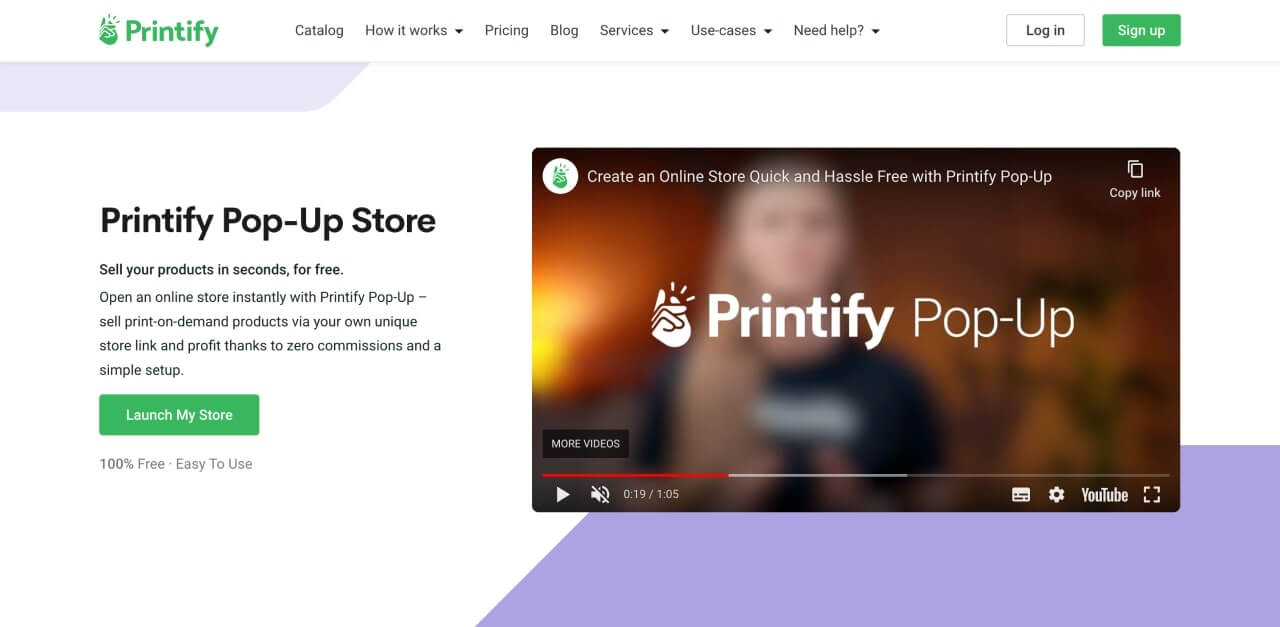
The Printify Pop-Up Store is perfect for aspiring entrepreneurs. It’s a hassle-free way to start a t-shirt store or a merch business.
Pros:
- Quick and easy setup. Simply create a store page and get a unique link to share with your audience.
- Worldwide network of Print Providers. Reach your customers quickly with our extensive network of more than 80 thoroughly vetted Print Providers.
- Streamlined production. As soon as you make a sale, we’ll print, package, and ship your t-shirts directly to your customers.
With the Printify Pop-Up Store, you can say goodbye to intricate store setups, expensive domains, listing fees, and other burdens of starting, running, and managing a store.
A few other noteworthy mentions
T-shirt and artwork marketplaces
Sometimes also referred to as print-on-demand websites, these marketplaces enable you to upload a t-shirt design, create mockups, and sell to a pre-existing audience. A great place for graphic designers and entrepreneurs alike.
Three great examples:
Marketplaces
While everyone knows marketplaces like Amazon, Etsy, and eBay that provide an opportunity to reach tens of thousands of potential buyers, there are other marketplaces you might not have heard of.
Two great examples:
Whichever sales channel you plan on using, carefully study their pricing, fees, and features to avoid any confusion and trouble down the road.
Sell t-shirts online using Printify

With Printify’s print-on-demand service, selling shirts is easy. Anyone can launch their own business and start making money online.
Our beginner-friendly platform is 100% free and available to everyone. With just a few clicks, you can design, create, and sell original print-on-demand t-shirts. Here’s how.
Step 1: Sign up
After signing up, you can access a large selection of customizable t-shirts, free design tools, and our wide network of carefully vetted Print Providers.
Step 2: Select a product
In our Catalog, we offer a world of custom t-shirts for every taste. Browse through our selection and pick your favorite. Then, click Start designing to begin creating t-shirts.
Step 3: Apply or create your own designs
With our Product Creator, creating your own t-shirt designs is easy. Apply a design or use our AI Image Generator, Text Editor, and Graphics Library to create your designs.
Step 4: Select a sales channel
We provide seamless integrations with some of the largest players in eCommerce, so you can reach your audience easily.
Closing thoughts
Finding the best site to sell t-shirts on is much easier after you explore their strengths and weaknesses.
When choosing a sales channel, the more you learn about it, the better, so carefully study features and pricing to make the right decision for your online store.
Once you’ve selected your sales platform, the next step is to source the t-shirts to sell. That’s where Printify comes in with its global printing network, extensive range of t-shirts, and free automation tools.
The best part? Printify seamlessly integrates with all the mentioned sales channels, making it the ultimate solution for your t-shirt selling needs.












